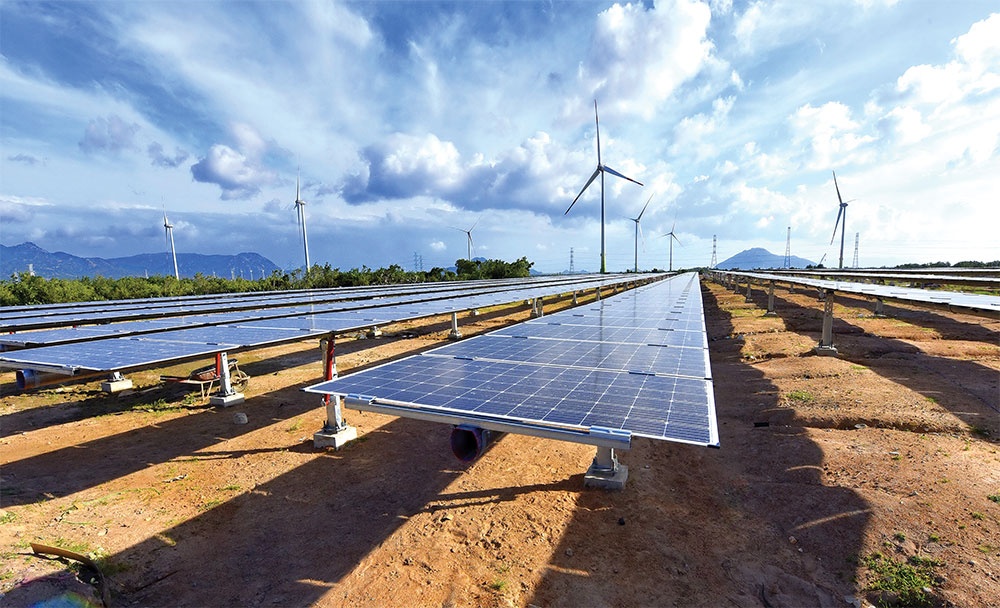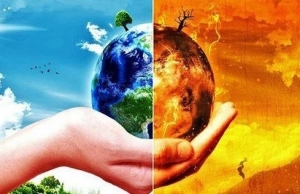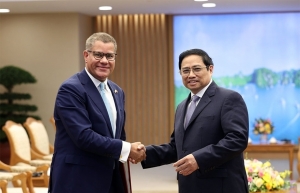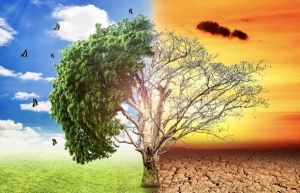Overseas investors chime in on climate change conundrum
At the webinar Vietnam’s Green Economy – Opportunities for Sustainable Investment on October 6, Filippo Scaglia, advisor for International Business at Dezan Shira & Associates, and Erick Contreras, managing director at BASF Vietnam, gave a comprehensive overview on the pressing environmental issues.
These included climate and energy – especially related to Vietnam’s commitments – circular economy, green financing, the nation’s Power Development Plan VIII (PDP8) and energy-related policy, as well as the potential market for renewable energy and opportunities for foreign-based investors.
At the webinar, coorganised by Dezan Shira Vietnam and the European Chamber of Commerce Vietnam (EuroCham), Julia Goeb, head of Marketing for Vietnam at Dezan Shira pointed out, “We believe there are plenty of opportunities in many industries that allow investors from all over the world to become a part of Vietnam’s green transition.”
Goeb added that her company’s collaboration with EuroCham comes as “the country is one of those most affected by climate change.” Thus, the partnership aims to raise further awareness for sustainable development as well as a transition to a green economy.
 |
| The opportunities for overseas investment in sectors like renewables and circular economy are deemed unprecedented Photo: Le Toan |
Investments in climate
Scaglia outlined some of the anticipated impacts of climate change on Vietnam, along with the strategies and actions that the country has been initialising to combat the possible dilemma.
As such, the Vietnamese government has not only been highly committed to tackling challenges related to and meeting the targets set by the current draft of the PDP8 and other regulations approved by the Ministry of Industry and Trade but also announced several goals, both at COP26 and in the 2021 report by the Electricity and Renewable Energy Authority under the same ministry.
Scaglia from Dezan Shira said, “At COP26 the prime minister of Vietnam committed to reaching net zero by 2050, which is an ambitious plan, but I believe it’s quite reasonable because the previous commitment was to reach it by 2060. So, as the public announcement was made for 2050, I believe that they are quite confident in their means and ability to actually reach this goal.”
Combined with a number of government incentives for sustainable sectors and environmentally friendly production and business practices, the opportunities for overseas investment in sectors like renewables, circular economy, and environmental protection, among many others, would be unprecedented, Dezan Shira has previously stated.
Scaglia explained last week that especially solar and wind power have been in the focus of the country’s investment encouragement. “This means that foreigners can fully own a legal entity in one of these sectors in Vietnam, in addition to several other incentives (see box),” Scaglia said.
“Solar power development has seen exponential growth in the last two years. And this is mostly due to the feed-in tariff that set the price for which Electricity of Vietnam would buy electricity. And this tariff was available for all plants that were brought into operation between 2020 and 2021, specifically for the solar and wind sector,” Scaglia added.
Adding circularity
| Investment incentives in renewable energies Corporate income tax + Tax holiday of up to four years + 50 per cent reduction for the following nine years + Preferential rate of 10 per cent for 15 years Import tax exemption + On goods used to form the fixed assets of the project + Land rental exemption + For a period of 3-15 years, depending on the location Others + Vietnam Development Bank loans + Investment protection Source: Filippo Scaglia, Dezan Shira & Associates |
Erick Contreras from BASF Vietnam focused on the most pressing issues regarding plastics and the circular economy. He pointed out that the Mekong is one of the eight rivers that are primarily polluting our oceans. “That’s why there’s a lot of focus on the Law on Environmental Protection and the circular economy in this country,” he said.
Contreras went on to explain that Vietnam’s plastic consumption rate has increased dramatically in the last three decades. While in 1990, the country consumed around 3.8kg per person annually, this figure rose to 38kg around 2013 and 41kg in 2020. Both Ho Chi Minh City and Hanoi would release around 80 tonnes of plastic waste per day, making up 16 and 8 per cent of total solid waste, respectively.
Meanwhile, the national recycle rate is extremely low, standing at just around 10 per cent, meaning that 90 per cent of plastics end up on landfills, equivalent to about 2.5 million tonnes of plastic per year.
There are several actions and regulations that Vietnam has been initiating, is planning to do so, or should do. What needs to be done, Contreras said, would thus include steps to reduce plastic waste, substitute by other materials, reduce mismanaged waste, and improve disposal.
One strong example involves a better substitute than coated paper for plastic bags. “Coated paper is not so easy to dispose of because the coating itself is also plastic,” he explained. “So, one of the solutions that we came up with involves water-based grease barriers for bags as a sustainable alternative that can actually still biodegrade.”
The BASF managing director also outlined what the goal towards a circular economy, as opposed to linear and recycling economies, are. “What we really want is minimum waste and the lowest carbon footprint. That’s why we want to recycle and reuse it as much as possible in as many circles as possible to be able to reduce that waste in the end,” he added.
In terms of legalities, Contreras emphasised that there are also many opportunities for investments because regulation, such as the Law on Environmental Protection Law 2020, which introduced the concept of extended producer responsibility, specify the responsibilities of producers and importers with regard to the recycling and treatment of discarded products and packages.
“This means there are definitely a lot of opportunities because either a company does it itself or they pay a third party or into the environmental fund. Most companies like ours, or even small businesses, would either invest or co-invest in such solutions,” Contreras said.
However, there would also be many different sectors that could attract investment. “Of course, you have the automotive sector. And, I see packaging as the most relevant and pressing area in terms of opportunities to produce either compostables, alternative packaging, or return systems,” he added.
A lot of investment would also go into the large fast-moving consumer goods companies and brands, “not necessarily just from the brands but along the value chain.”
EuroCham is also set to organise and hold the first Green Economy Forum and Exhibition in Vietnam on November 28-30 in Ho Chi Minh City. The event will combine expertise from Vietnam and several European countries to take part in the transition to a green economy, and will feature the full support of local agencies and authorities.
 | National Strategy on Climate Change for 2050 approved Hanoi - Deputy Prime Minister Le Van Thanh has signed a decision approving the National Strategy on Climate Change for 2050. |
 | PM hails contributions of COP26 President Prime Minister Pham Minh Chinh has hailed President of the 26th United Nations Climate Change Conference (COP26) Alok Kumar Sharma, who is also British Minister for the Cabinet Office, for his contributions to stepping up the delivery of COP26 commitments. |
 | Vietnam calls for comprehensive approach in addressing climate change challenges Vietnam called for a comprehensive approach in addressing challenges relating to climate change, environment and bio-diversity, at a meeting of the Economic and Financial Committee of the United Nations General Assembly’s 77th session on October 10. |
What the stars mean:
★ Poor ★ ★ Promising ★★★ Good ★★★★ Very good ★★★★★ Exceptional
Related Contents
Latest News
More News
- $100 million initiative launched to protect forests and boost rural incomes (January 30, 2026 | 15:18)
- Trung Nam-Sideros River consortium wins bid for LNG venture (January 30, 2026 | 11:16)
- Vietnam moves towards market-based fuel management with E10 rollout (January 30, 2026 | 11:10)
- Envision Energy, REE Group partner on 128MW wind projects (January 30, 2026 | 10:58)
- Vingroup consults on carbon credits for electric vehicle charging network (January 28, 2026 | 11:04)
- Bac Ai Pumped Storage Hydropower Plant to enter peak construction phase (January 27, 2026 | 08:00)
- ASEAN could scale up sustainable aviation fuel by 2050 (January 24, 2026 | 10:19)
- 64,000 hectares of sea allocated for offshore wind surveys (January 22, 2026 | 20:23)
- EVN secures financing for Quang Trach II LNG power plant (January 17, 2026 | 15:55)
- PC1 teams up with DENZAI on regional wind projects (January 16, 2026 | 21:18)

 Tag:
Tag:




















 Mobile Version
Mobile Version